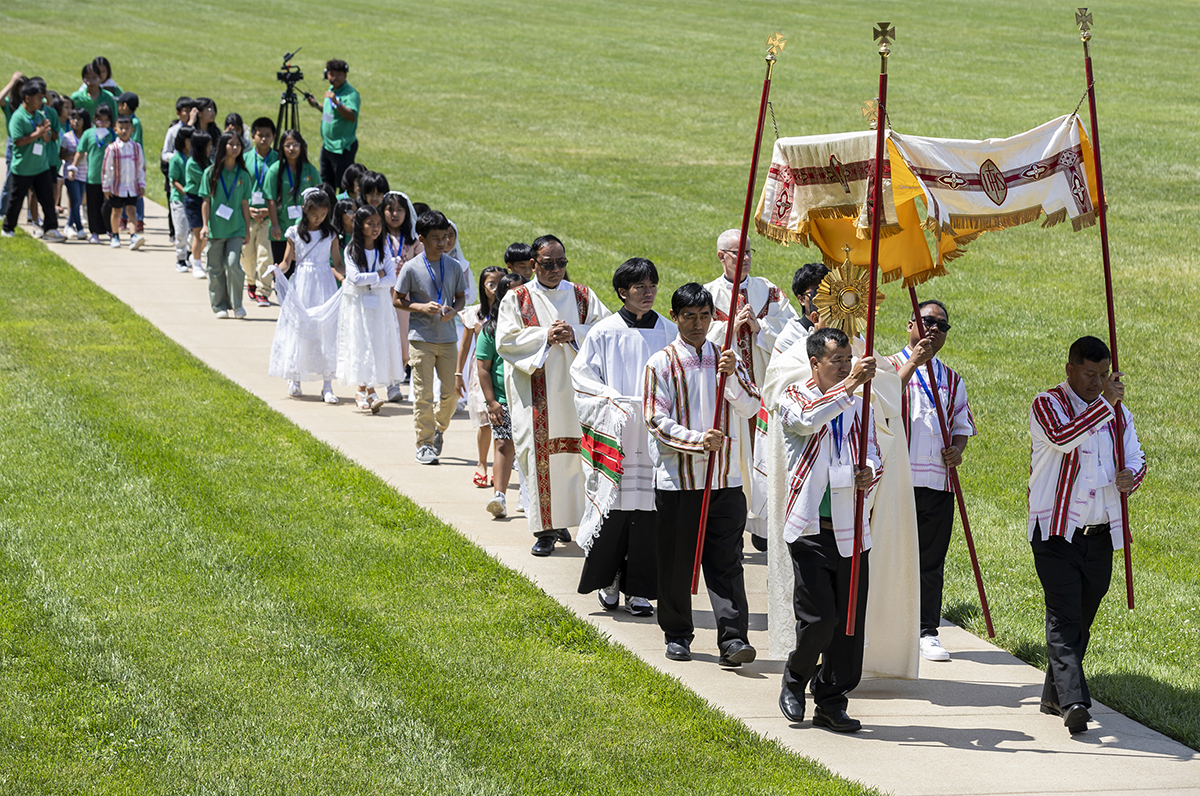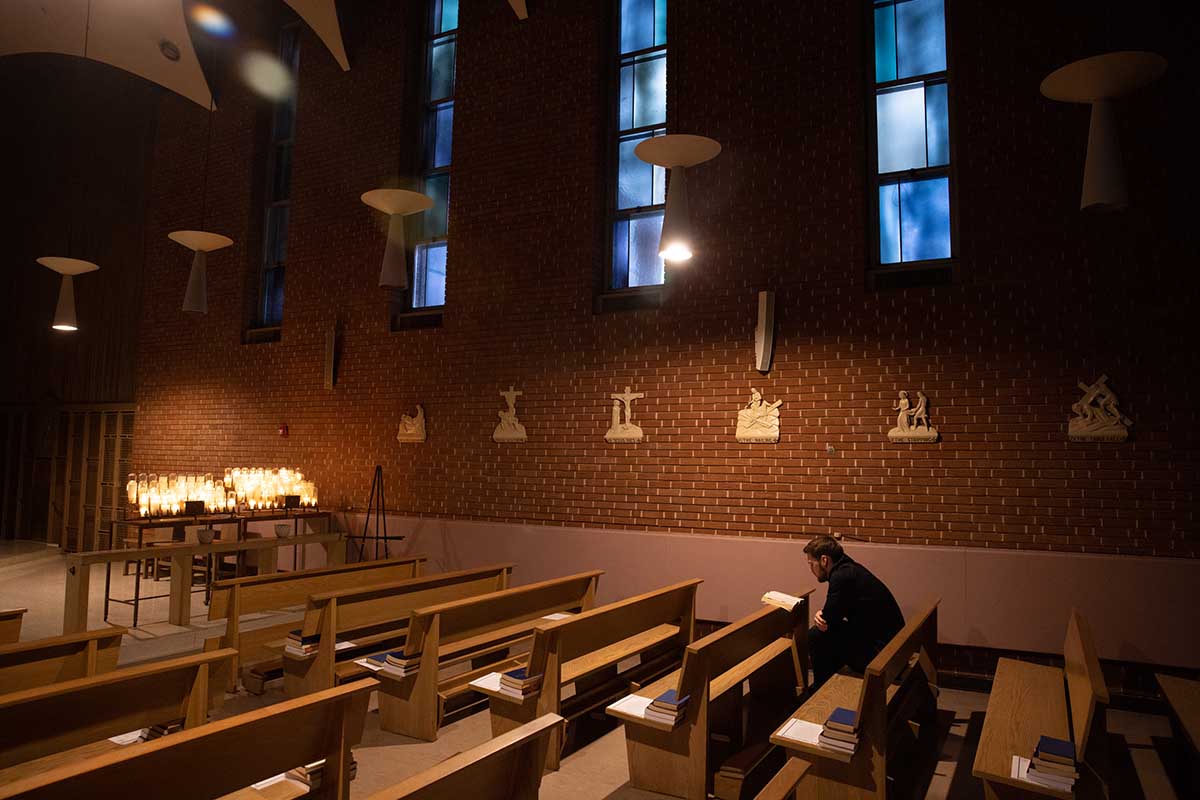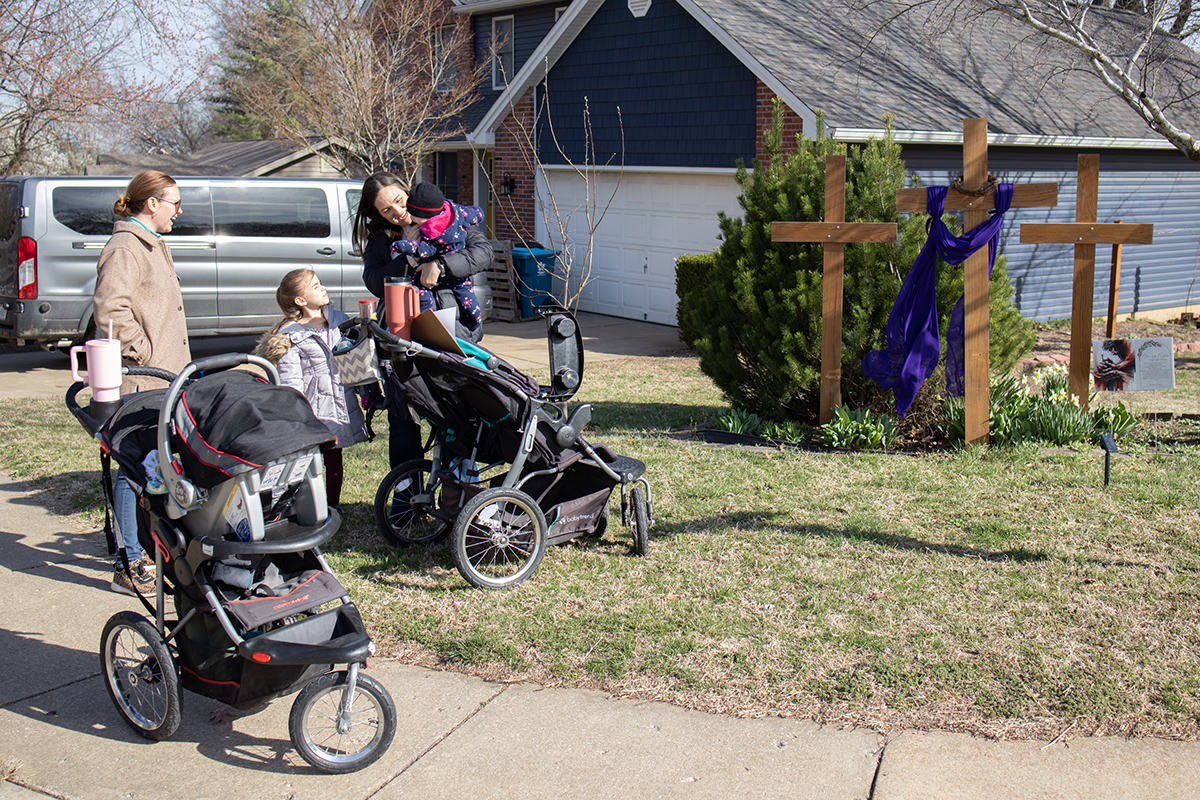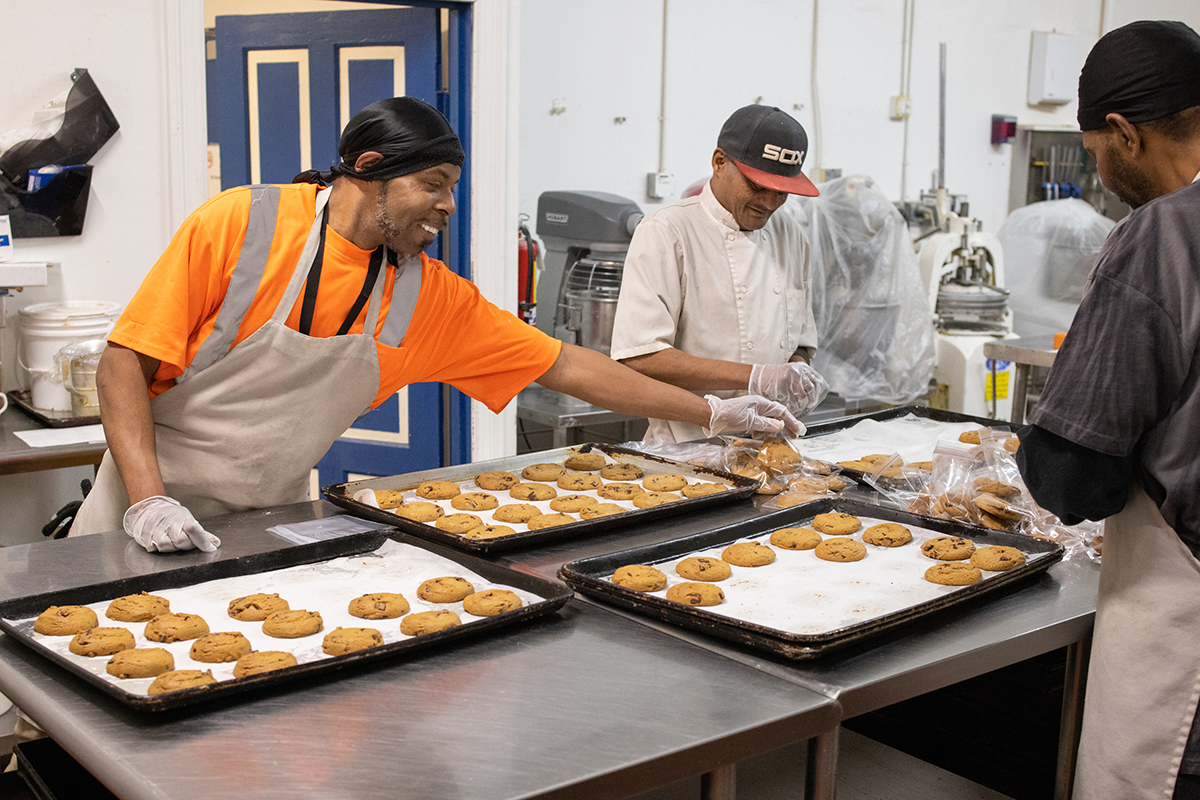Walking the path to a better life: Pathways to Progress program takes a comprehensive approach to ensuring rights and accepting responsibilities
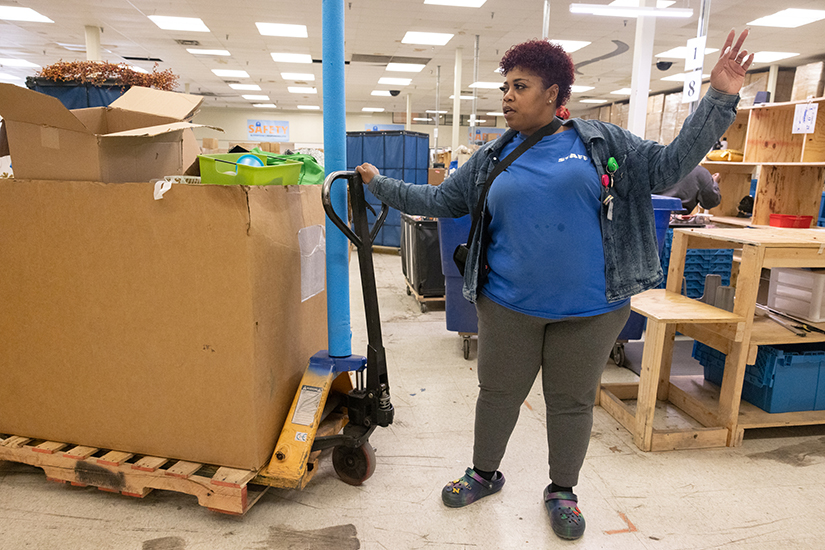
Pathways to Progress program takes a comprehensive approach to ensuring rights and accepting responsibilities
Every weekday, India Brown can be found at the St. Vincent de Paul thrift distribution center in Cool Valley, processing donations and sorting and pricing items. She laughs and jokes with her coworkers as they go, calling them “my second family.”
It wasn’t long ago that Brown’s connection to the Society of St. Vincent de Paul looked a little different — she was receiving thrift store vouchers and utility assistance. Now, she’s glad that her work supports other people who find themselves in need of help.
Brown and her family were among the 13 households that graduated this past fall from Pathways to Progress, a joint program of Catholic Charities of St. Louis and St. Francis Community Services. Working with all eight Catholic Charities federated agencies and other key community partners, the program provides long-term, wrap-around case management and support services, working with members to enhance individual strengths, develop skills and build financial assets that empower their families toward stability and long-term economic independence. The “long-term” part is key — while many programs have time limits of a few months or a year, Pathways to Progress members typically stay in the program for a few years, giving them the time needed for long-lasting growth.

The program helps address rights and responsibilities, which form one of the tenets of Catholic social teaching. This teaching reminds us that every person has a fundamental right to life and a right to those things required for human decency. Corresponding to these rights are duties and responsibilities — to one another, our families and the larger society.
Pathways to Progress was launched in 2016 in north St. Louis County and opened a second location in north St. Louis city in 2021. Six member advisers — one in north city and five in north county — currently work with 65 households, which include 74 adults and 173 children. Twenty-eight households have graduated since the program began, with 13 graduating in 2022.
Achieving her goals
Brown was one of the initiative’s first members. When she entered, she had a lot going on: “Legal trouble, trouble with my kids, housing trouble, employment trouble,” she said.
She was on probation after passing a bad check to buy food and diapers for her young children, she said, and her probation officer referred her to Pathways to Progress. She was initially hesitant to open up her life to her first member adviser, Wade, but she grew more comfortable as they built trust between them. “No matter what I had going on, he did not judge me in any way,” she said.
Member advisers and members work together to set goals and determine how to attain them. During her years in the program, Brown was able to get her driver’s license reinstated, find better housing for her family and stabilize her finances.
With a felony on her record, Brown had struggled to find and keep a good job. But when she interviewed at the St. Vincent de Paul thrift distribution center, she was hired on the spot. She easily recalls the day she was hired — Sept. 17, 2021. Since then, she’s gotten two raises and a promotion.
“I will forever be grateful to St. Vincent de Paul, because they didn’t just look at my background — they looked at me as a person,” Brown said.
Brown took advantage of Pathways to Progress’ monthly life skills and financial literacy classes on topics like budgeting, building credit, crafting a resume and parenting strategies.
The regular one-on-one check-ins and advice from member adviser Sandy Watson, who took over as Brown’s adviser when she joined Pathways to Progress about five years ago, made all the difference, Brown said.
Watson works with 12 members at a time to assess needs, set goals and meet regularly to talk about progress. “The main thing is just to be there for them, for whatever they may need,” she said.
Right now, housing is “the number one issue” that her member households face, Watson said. There’s a lack of affordable housing in north St. Louis County, even for families with Section 8 vouchers. There also aren’t many higher-wage jobs around the area right now, she said, which causes dominos of other obstacles — access to reliable transportation, extended child care and more.
That’s why working with her members to address all aspects of their lives, over a multi-year period, is so needed, she said.
The most rewarding part of her job is “seeing people when they graduate — knowing where they started in the program and seeing all the progress they made,” Watson said. When she and her members agree that it’s time for them to graduate, she goes back through all of the goals they set over the years. “I say, congratulations! You’ve accomplished this, you’ve accomplished that. You’ve got this.”
Passing it on
Since she no longer feels like she is in constant crisis mode, Brown has been able to focus more on others, she said. With her regular 9-5 work hours, she can be home every evening to cook dinner and help her kids with homework. She’s passed on what she learned about creating and sticking to a budget to her two young adult children; she’s more patient and understanding with her tweens, drawing on the parenting strategies discussed in her classes.
Around Christmas, she and some relatives put together personal hygiene kits to pass out to people experiencing homelessness. Brown is an experienced hair braider, and she wants to start offering free hair braiding to the children of struggling moms in her social circles.
As a Pathways to Progress graduate, she’s always welcome back at the monthly classes and to speak with members currently enrolled in the program. And, of course, she keeps in touch with Watson. “She’ll text me or email me to ask me how I’m doing,” Brown said. “And she always tells me that if there’s anything I need, to let her know.”
Brown’s advice for anyone — Pathways to Progress members or not — is never to be afraid to ask for help. We all have the responsibility to take care of each other.
“No matter how successful you are, how much money you have — everybody needs somebody,” she said. “You’re always going to need somebody.”
>> Rights and Responsibilities
The Catholic tradition teaches that human dignity can be protected and a healthy community can be achieved only if human rights are protected and responsibilities are met. Therefore, every person has a fundamental right to life and a right to those things required for human decency. Corresponding to these rights are duties and responsibilities — to one another, to our families, and to the larger society.
To learn more, visit stlreview.com/42cvGXl
>> Catholic social teaching and Lent
Catholic social teaching is the collection of the Church’s wisdom on building a just society and living lives of holiness amidst the challenges of modern society. Modern Catholic social teaching has been articulated through a tradition of papal, conciliar and episcopal documents, beginning with Pope Leo XIII’s 1891 encyclical “Rerum novarum: On capital and labor.”
The Compendium of the Social Doctrine of the Church explains, “The Church exists and is at work within history. She interacts with the society and culture of her time in order to fulfill her mission of announcing the newness of the Christian message to all people, in the concrete circumstances of their difficulties, struggles and challenges. She does so in such a way that faith enlightens them so that they can understand the truth that ‘true liberation consists in opening oneself to the love of Christ.’ The Church’s social pastoral ministry is the living and concrete expression of the full awareness of her evangelizing mission in the social, economic, cultural and political realities of the world.” (Compendium of the Social Doctrine of the Church, 524)
Catholic social teaching is “an essential part of being Catholic,” said Father Don Henke, associate professor of moral theology at Kenrick-Glennon Seminary and pastor of St. Michael the Archangel Parish in Shrewsbury. But because of the wideness and depth of moral issues that make up social teaching, it can often be misunderstood. Some other aspects of moral theology are founded on “negative principles,” like “thou shalt not steal, thou shalt not kill,” Father Henke explained. “But what makes Catholic social teaching unique — and a lot more difficult — is that it focuses primarily on positive moral principles. It draws us to consider the things that we should do.”
It’s easy to tell if we’ve stolen or killed someone. But we have to wrestle with the question of whether we are truly upholding the dignity of all people, or showing preferential care for the poor, Father Henke said, and people can live out the teachings in a vast number of ways.
The important thing is that we do recognize our duty to participate in the work of Christ in the world, Father Henke said. “As St. Teresa of Avila said, we are Christ’s hands and feet, we are the way Jesus cares for people in the world,” he said.
Engaging in social efforts is a natural path for evangelization, too, when we share our “why” with others, he said.
“It would be wasting good efforts if we’re not saying that we are engaging in and doing these things because of our love for Jesus,” Father Henke said. “We’re modeling our lives after Him, and we’re meant to show our love of Him by how we love our neighbor.”
The reflection and sacrifice that we’re all called to during Lent makes the season an optimal time to consider how we are engaged in and upholding the principles of Catholic social teaching, said Father Henke.
During each week of Lent, the St. Louis Review will feature one of the seven themes of Catholic social teaching.
Feb. 20: Life and Dignity of the Human Person
Feb. 27: Call to Family, Community and Participation
March 6: The Dignity of Work and the Rights of Workers
March 13: Preferential Option for the Poor
March 20: Rights and Responsibilities
March 27: Solidarity
April 3: Care for God’s Creation
To read more about the seven themes of Catholic social teaching, visit stlreview.com/3YtSQWO.
For more resources on Catholic social teaching, visit stlreview.com/3Isancy.
Read installments of this series by visiting stlreview.com/3xnateX
>> Catholic Charities of St. Louis
“Inspired by Jesus Christ, we serve people in need, work to improve social conditions, and unite with others in this mission,” Catholic Charities of St. Louis’ mission statement reads. Catholic Charities of St. Louis has been helping people in need since 1912. In 2021, more than 96,000 people benefitted from Catholic Charities of St. Louis federation services, according to the organization’s annual report.
Catholic Charities of St. Louis includes eight federated agencies and Language. Access. Multicultural. People. (LAMP)
•Cardinal Ritter Senior Services
•Good Shepherd Children & Family Services
•Marygrove
•Queen of Peace Center
•Saint Louis Counseling
•Saint Martha’s
•St. Francis Community Services
•St. Patrick Center
To learn more about Catholic Charities of St. Louis, including how to get services, volunteer or donate, visit ccstl.org.
Pathways to Progress
Pathways to Progress is a joint initiative of Catholic Charities of St. Louis and St. Francis Community Services, which is responsible for its day-to-day operations. It was founded in 2016 in north St. Louis County, operating out of the former school building on the campus of Holy Name of Jesus Parish in Bellfontaine Neighbors. A second location opened in 2021 at “The Hub” in north St. Louis city to serve the Jeff-Vander-Lou, Ville and Greater Ville neighborhoods.
Working with all eight Catholic Charities federated agencies and other key community partners, the program provides long-term, wrap-around case management and support services, working with members to enhance individual strengths, develop skills and build financial assets that empower their families toward stability and long-term economic independence.
Sixty-five households, which include 74 adults and 173 children, are currently enrolled in the program. Twenty-eight households have graduated since the program began, with 13 graduating in 2022.
To learn more about Pathways to Progress, visit ccstl.org/pathways-to-progress.
Every weekday, India Brown can be found at the St. Vincent de Paul thrift distribution center in Cool Valley, processing donations and sorting and pricing items. She laughs and jokes … Walking the path to a better life: Pathways to Progress program takes a comprehensive approach to ensuring rights and accepting responsibilities
Subscribe to Read All St. Louis Review Stories
All readers receive 5 stories to read free per month. After that, readers will need to be logged in.
If you are currently receive the St. Louis Review at your home or office, please send your name and address (and subscriber id if you know it) to subscriptions@stlouisreview.com to get your login information.
If you are not currently a subscriber to the St. Louis Review, please contact subscriptions@stlouisreview.com for information on how to subscribe.

